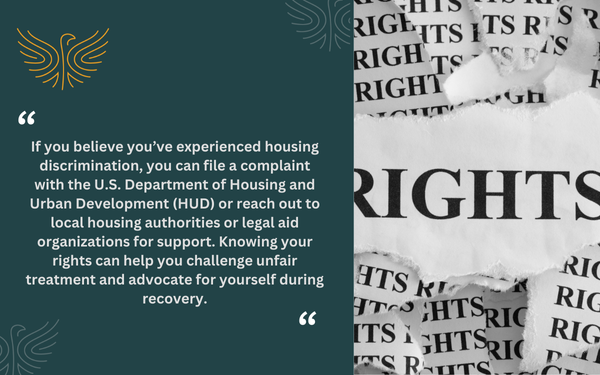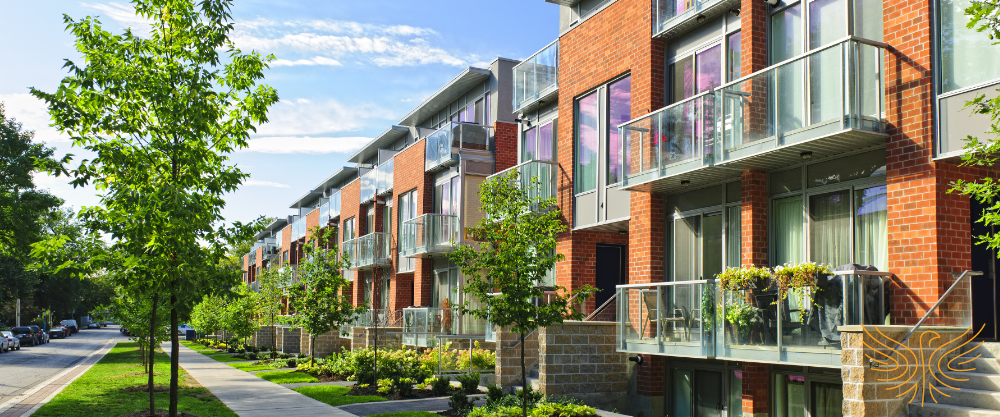A safe and stable place to live provides the foundation for rebuilding your life after treatment and while still making meaningful progress in your recovery journey. It offers security, consistency, and a supportive environment where recovery can take root and thrive.
Yet, many people face unexpected barriers when searching for housing after treatment—often because of stigma, past records, or misconceptions about substance use. For individuals working hard to rebuild their lives, this kind of discrimination can feel discouraging and overwhelming.
But you’re not alone, and you do have rights. So, why does this discrimination happen? And how can you respond and advocate for yourself?
_______________________________________________________
Navigating Housing Discrimination
Housing discrimination during recovery often stems from misunderstandings, stigma, and outdated perceptions about addiction. While recovery is a process of rebuilding, some landlords, property managers, and housing authorities may judge based on past records, previous evictions, criminal charges, or ongoing treatment. And some may wrongly assume that individuals in recovery are unreliable tenants or unsafe neighbors.
Unfortunately, these misconceptions can make finding stable housing difficult after rehab—even when you’re doing the hard work to move forward. The good news is that you have rights, options, and resources to help you navigate these barriers and secure the supportive environment you need to thrive. So, with that in mind, here’s what you should know to navigate this unexpected hurdle to propel your recovery forward.
Know Your Rights
In the United States, people in recovery from substance use disorder are often protected under the Fair Housing Act (FHA) and the Americans with Disabilities Act (ADA). These laws generally recognize substance use disorder as a disability when an individual is not currently using illegal drugs and is seeking or maintaining recovery.
This means that landlords, property managers, and homeowners’ associations cannot legally deny housing solely because of a person’s history of substance use, participation in treatment programs, or recovery status.
Examples of illegal discrimination include:
- Refusing to rent to someone because they attended rehab or are in recovery
- Applying stricter rules or requiring higher deposits specifically due to past substance use
- Denying reasonable accommodations, such as allowing a support person or service animal when needed for recovery
However, these protections do not apply to individuals who are currently engaging in illegal drug use or whose behavior poses a direct threat to others’ safety or causes substantial property damage.
If you believe you’ve experienced housing discrimination, you can file a complaint with the U.S. Department of Housing and Urban Development (HUD) or reach out to local housing authorities or legal aid organizations for support. Knowing your rights can help you challenge unfair treatment and advocate for yourself during recovery.

Consider Transitional Housing Options
If finding immediate housing feels overwhelming, transitional housing can provide a stepping stone toward long-term stability. Options include:
- Sober living homes
- Halfway houses
- Community-based programs
When exploring these options, ask questions about the program’s rules, safety measures, and level of support. Not all transitional housing environments are created equal, so it’s important to find one that aligns with your recovery goals.
Gather Documents & Come Prepared
Being proactive can make a significant difference when navigating potential housing barriers. Having the right documentation ready can ease landlords’ concerns and strengthen your application. Consider preparing:
- Proof of income or a letter from an employer
- References from past landlords, employers, or treatment providers
- A brief, respectful explanation of gaps in employment or housing due to treatment (if you feel comfortable sharing)
You don’t need to disclose personal details about your recovery unless you choose to. Focus on presenting yourself as a responsible and committed tenant who is actively working towards stability.
Lean on Your Support System & Advocate for Yourself
Various professionals and organizations are dedicated to helping individuals in recovery navigate issues and access safe housing. For instance, legal aid groups can assist with understanding your rights and filing claims when discrimination occurs. Recovery coaches or case managers at your rehab center can further connect you with housing programs, community resources, and tenant support services.
In some cases, housing counselors can even advocate on your behalf and help mediate directly with landlords.
Additionally, recovery groups, local networks, and your dedicated rehab center, such as Freedom Recovery Centers (FRC), often have connections to housing opportunities and can guide you toward trusted options. Through these connections, you can gain access to peer-led referrals from individuals who have faced similar challenges, shared housing within recovery-focused communities, and recommendations for landlords who are open and supportive of people in recovery.
Plus, building relationships within these networks not only expands your housing options but also fosters a sense of belonging and understanding, which can be crucial during those early stages in recovery or post-rehab.
_______________________________________________________
How Freedom Recovery Centers Can Help
At FRC, we recognize that securing safe, stable housing is a crucial component of the recovery process. Navigating housing challenges and facing discrimination can feel overwhelming, but you don’t have to do it alone. Our team is here to guide you through every step—whether that means connecting you with trusted housing resources, helping you understand your rights, or providing direct referrals to supportive programs and recovery-focused living environments.
We believe that long-term healing requires more than treatment alone—it’s about creating a solid foundation for your future. From personalized recovery plans to community-based resources, we’re committed to helping you build stability, regain your confidence, and take the next step toward independence.
If you or someone you love is struggling to secure safe housing while rebuilding life in recovery, reach out today. We’re here to support you, advocate for you, and walk alongside you on your journey toward lasting change. When you’re ready, call us at 804-635-3746. We’re here to support you through every hurdle, guiding you toward sustainable and lasting recovery.
.svg)






.svg)

.svg)



.svg)
